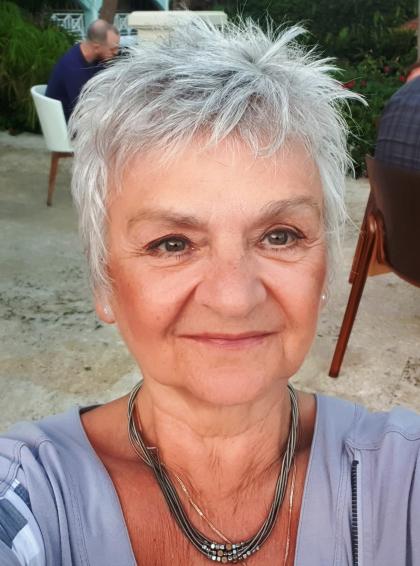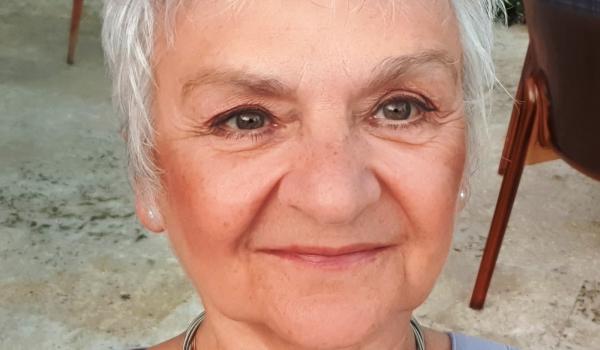We need to listen to the symptoms. I knew what they were and still managed to put them down to other things. Although perhaps if it hadn’t been at the start of a pandemic, during a national lockdown, I may have tried to go to my GP a bit earlier.
An annual CA-125 test
My mum had fallopian tube cancer, so I get a CA125 blood test every year. In March 2020, I went in for my test and the results came back normal so I thought no more about it. Then the country went into lockdown.
I started to experience some abdominal pain in the May and thought I could feel something hard in my stomach. I initially attributed it to IBS brought on by the stress of the pandemic, but by mid-July the symptoms were so bad that I was struggling to sleep.
I would feel full quickly and started to get breathless after regular everyday tasks. That was when I contacted my GP.

After a telephone consultation, the doctor invited me in for a face to face appointment. I’m still so grateful that she did. During her examination she felt that my womb was enlarged. That was when the alarm bells first started ringing as I’d had a complete hysterectomy years before.
A new CA125 test came back at 1,771 and I think I went into shock. Such a difference in just a few months.
I was sent for an ultrasound, and I could tell that the sonographer knew what it was. I knew what it was really – it was a tumour. From there I was referred to a gynaecologist who unfortunately presented himself with no real empathy.
During our first conversation he claimed that ‘it’s obvious you have cancer’, not news that anyone should have to hear so abruptly.
Misdiagnosis and the impact of the pandemic
Following a CT scan, that same gynaecologist called with the results explaining that as I had a pleural effusion (an excessive collection of fluid in the lungs) it meant that my cancer was already at stage 4. Nothing can prepare you for that news, but to hear it so coldly with no offer of support was one of the most difficult things I’ve experienced.
Before I could start any treatment, I had to have the fluid drained. During that procedure, the sonographer mentioned that this fluid was very common in women with ovarian cancer. I found this quite encouraging as it could suggest that my cancer wasn’t yet at stage 4.
A sample of the fluid was tested and found to include abnormal cells but nothing that indicated cancer. Another positive sign.
Due to the pandemic my husband couldn’t attend any appointments with me – that was the worst thing about it all happening whilst living in a lockdown. However, I was very grateful that there were no real delays to my treatment, and I’d had my surgery by the beginning of September 2020.
The surgery was a success, removing a large mucinous tumour. It was then that my diagnosis was confirmed as stage 1c ovarian cancer. Not stage 4.
Chemotherapy
Although it was good news, it was still a cancer diagnosis and I assumed that the next step would be chemotherapy. Then my oncologist advised that it was up to me.
Mucinous tumours make up a very small percentage of ovarian cancers and they often don’t respond as well to chemotherapy as other types. That, coupled with the cancer now being classed as stage 1c meant that I had the choice of whether to proceed with chemotherapy or not.
I just wanted whatever was available to me to ensure that I was cancer free. In total, I had six sessions of carboplatin and paclitaxel chemotherapy which finished in January 2021.
I did experience some side effects, losing my hair and very intense migraines that made the sickness and nausea feel not too bad. I didn’t really get on with wearing a wig, but I almost enjoyed being bald – wearing lots of beautiful scarves.
Finishing treatment
It’s a strange feeling when you finish treatment. You fall into a routine of going to the hospital regularly with a support system of healthcare professionals around you, then suddenly it all ends. I felt quite adrift – not sure what was next.
Of course you feel good, you’re cancer free, but that feeling is transient. There’s always that thought of ‘but will it come back’. I've had genetic testing since my diagnosis but there were no markers found.
I completed a post treatment course with Maggie’s in early 2021, although everything was still online then, and have subsequently had some therapy sessions through the organisation to help me process what I’ve been through. I also practice mindfulness now, which doesn’t always work, but definitely helps.
This year, I had a bit of a scare after having some bowel problems and a CT scan indicated nodules in my abdomen. I was referred back to my gynaecological oncologist who compared it to my scan from two years ago. Thankfully there were no changes.
The nodules had been there then too, so it was nothing new. He then called me at home to confirm that it wasn’t anything for me to worry about. Such a lovely man, taking the time to put my mind at ease after everything that had happened previously.
Finding Target Ovarian Cancer and sharing my story
When I was undergoing treatment, I deliberately didn’t spend any time on google so to not frighten myself. However, after a while I felt more comfortable to see just what information was out there. I think it’s really beneficial to be able to read other women’s experiences with ovarian cancer – when you’re ready to.
I want to share my story for a few reasons really. I want to raise awareness of mucinous tumours in ovarian cancer as it is rare. Those diagnosed with it need more information and ideally more research needs to be done into alternate treatment options.
I also want to share my experience of pleural effusion as it doesn’t always immediately equate to stage 4 cancer.
I hope that GPs continue to listen and learn, considering patients when delivering news, taking into the account the when, where and why. Equally, I hope it helps women feel more confident in listening to their bodies and trusting when they feel that something is wrong.
If you’ve been affected by this story and would like to speak to a specialist nurse, you can call our dedicated support line on 020 7923 5475 or contact us: [email protected]. We're open from 9am until 5pm, Monday to Friday.
If reading this story has helped you, join the Ovarian Cancer Community to connect with more people affected by ovarian cancer: www.targetovariancancer.org.uk/onlinecommunity



